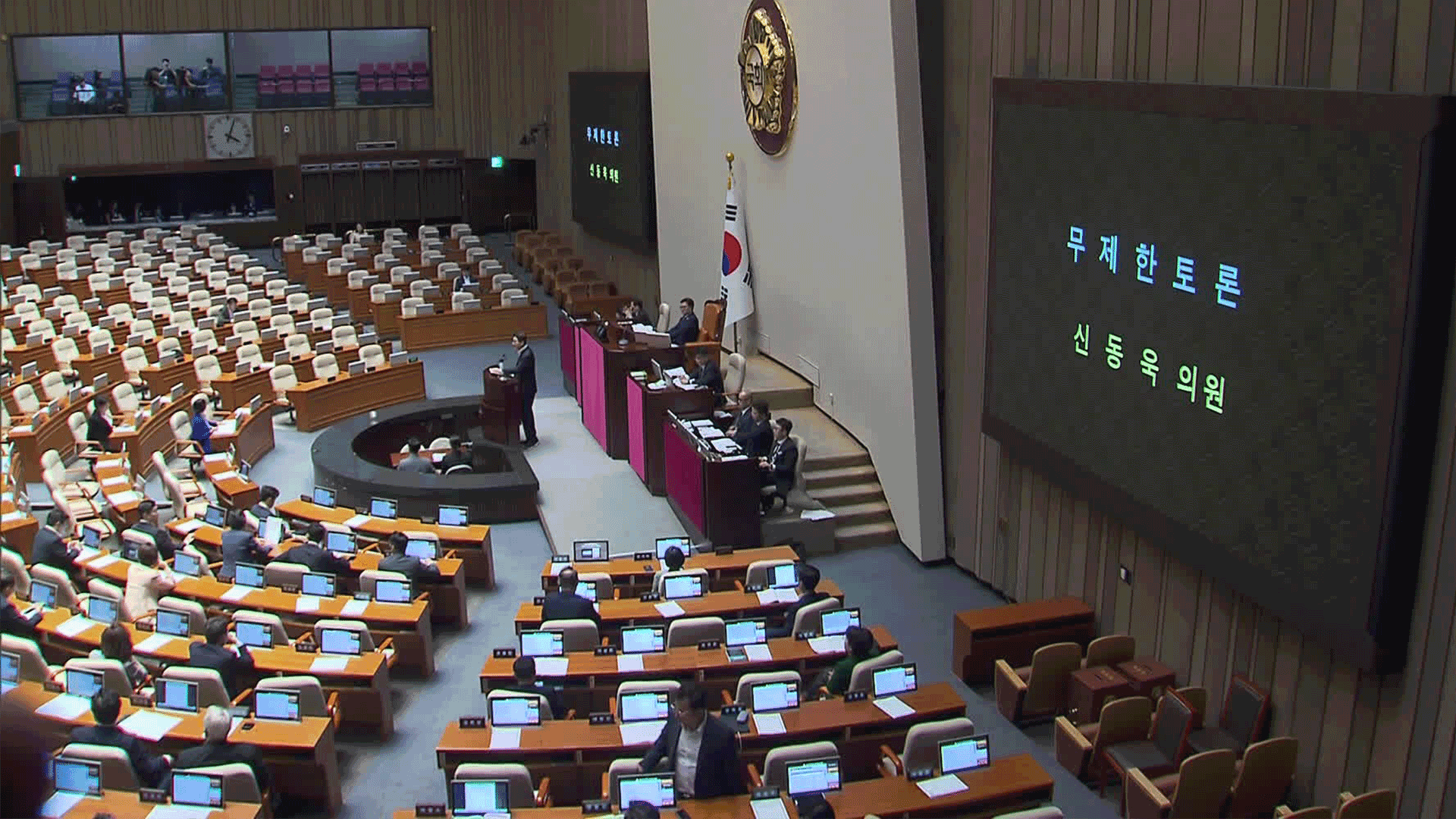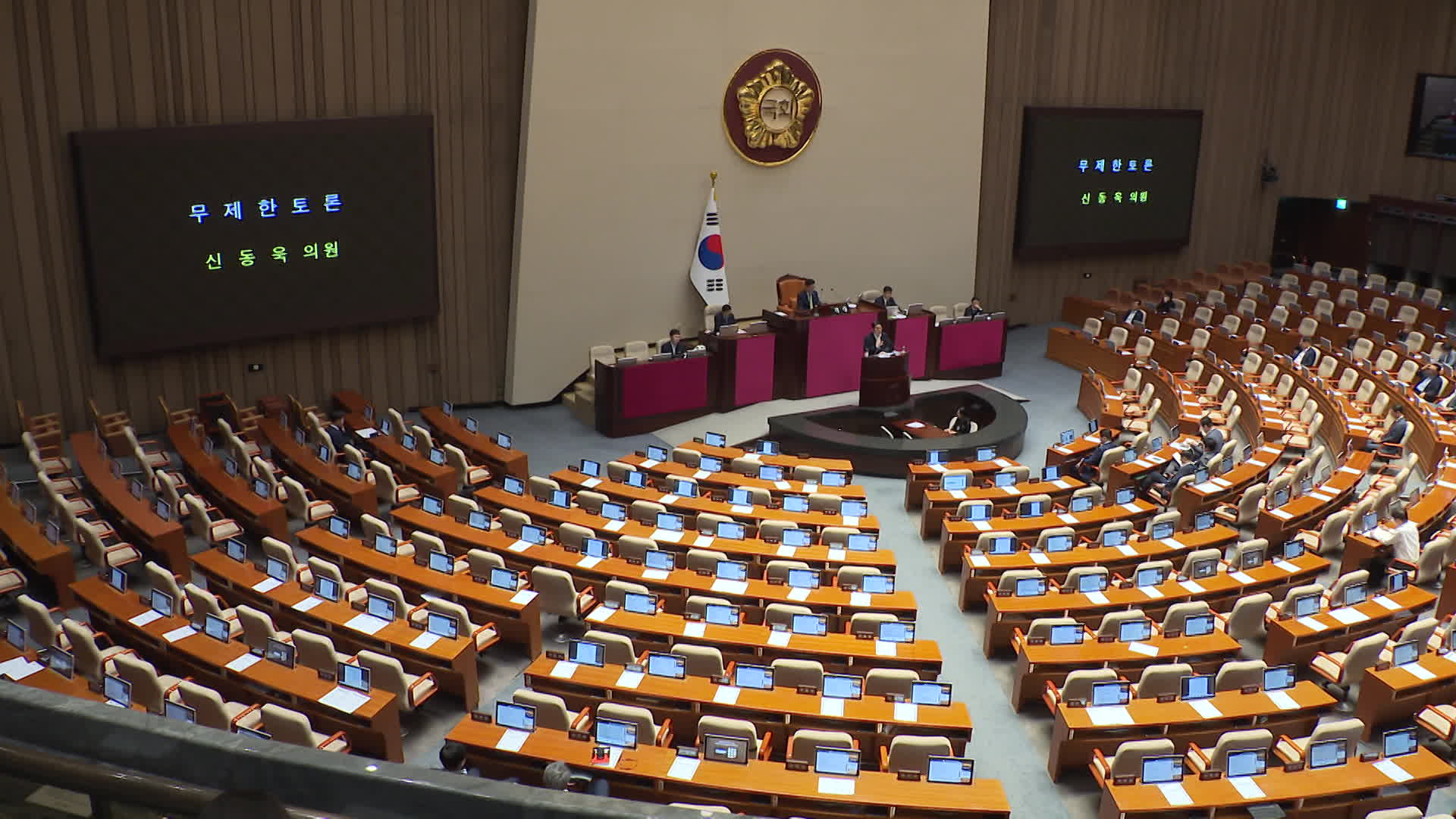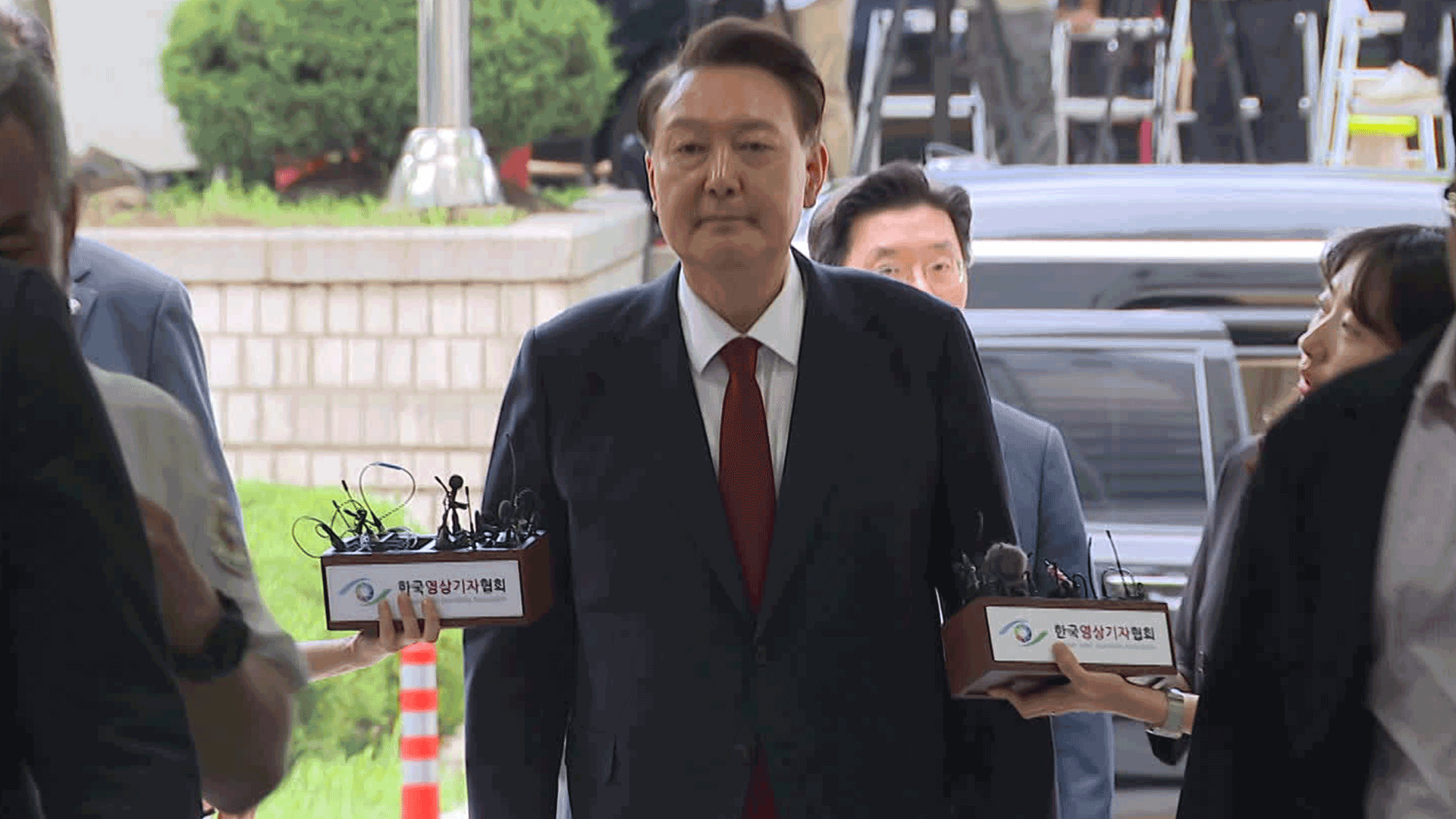[Anchor]
The Democratic Party, pushing ahead with reform legislation, has brought the Broadcasting Act revision bill to the floor today (8.4).
The People Power Party is opposing it, calling it a bill aimed at media control, and is staging a filibuster in response.
Let’s go to the National Assembly.
Reporter Kim Cheong-yoon, how is the filibuster unfolding?
[Reporter]
Yes, throughout this extraordinary session, the ruling and opposition parties have clashed over major reform bills such as the three broadcasting bills and the so-called 'Yellow Envelope Bill.'
The Democratic Party chose to prioritize the Broadcasting Act and brought it up for deliberation first. A filibuster is currently underway.
People Power Party lawmaker Shin Dong-wook was the first to speak and has been delivering a speech in opposition for five hours now.
The core of the proposed revision is to change the governance structure of broadcasters and establish program review committees with equal labor-management representation.
The Democratic Party says this bill is about returning public broadcasters to the people, while the People Power Party insists it’s a tool for political control over the media.
[Han Min-soo/Democratic Party Member: "It establishes a basis for CEO selection committees and the consent process for appointing news chiefs at the three public broadcasters and other news channels..."]
[Shin Dong-wook/People Power Party Member: “Is media reform about creating jobs for civic groups aligned with the Democratic Party and the Korean Confederation of Trade Unions? If you appoint your preferred executives, will that make it a broadcaster for the people?”]
[Anchor]
How long is the filibuster expected to last?
[Reporter]
Under the National Assembly Act, filibusters can run for up to 24 hours.
Since it began around 4 p.m. today, it can continue until 4 p.m. tomorrow (8.5), unless it’s ended early with the support of three-fifths of all lawmakers.
After that, the bill will go to a vote, and it’s expected to pass with the Democratic Party’s majority.
[Anchor]
There were several contentious bills. Why was the Broadcasting Act taken up first?
[Reporter]
As of this morning, there were rumors that the Yellow Envelope Bill would be prioritized.
However, after internal party meetings, the order shifted, and the Broadcasting Act was ultimately selected.
Analysts say this reflects the intent of DP leader Jung Chung-rae, who is pushing strongly for the “three major reforms.”
The remaining broadcasting-related bills, as well as the Yellow Envelope Bill and the Commercial Act amendment, are expected to be addressed during the August session.
Before bringing up the Broadcasting Act, the ruling and opposition parties passed 15 other bills, including the Grain Management Act.
Reporting from the National Assembly, this is Kim Cheong-yoon for KBS News.
The Democratic Party, pushing ahead with reform legislation, has brought the Broadcasting Act revision bill to the floor today (8.4).
The People Power Party is opposing it, calling it a bill aimed at media control, and is staging a filibuster in response.
Let’s go to the National Assembly.
Reporter Kim Cheong-yoon, how is the filibuster unfolding?
[Reporter]
Yes, throughout this extraordinary session, the ruling and opposition parties have clashed over major reform bills such as the three broadcasting bills and the so-called 'Yellow Envelope Bill.'
The Democratic Party chose to prioritize the Broadcasting Act and brought it up for deliberation first. A filibuster is currently underway.
People Power Party lawmaker Shin Dong-wook was the first to speak and has been delivering a speech in opposition for five hours now.
The core of the proposed revision is to change the governance structure of broadcasters and establish program review committees with equal labor-management representation.
The Democratic Party says this bill is about returning public broadcasters to the people, while the People Power Party insists it’s a tool for political control over the media.
[Han Min-soo/Democratic Party Member: "It establishes a basis for CEO selection committees and the consent process for appointing news chiefs at the three public broadcasters and other news channels..."]
[Shin Dong-wook/People Power Party Member: “Is media reform about creating jobs for civic groups aligned with the Democratic Party and the Korean Confederation of Trade Unions? If you appoint your preferred executives, will that make it a broadcaster for the people?”]
[Anchor]
How long is the filibuster expected to last?
[Reporter]
Under the National Assembly Act, filibusters can run for up to 24 hours.
Since it began around 4 p.m. today, it can continue until 4 p.m. tomorrow (8.5), unless it’s ended early with the support of three-fifths of all lawmakers.
After that, the bill will go to a vote, and it’s expected to pass with the Democratic Party’s majority.
[Anchor]
There were several contentious bills. Why was the Broadcasting Act taken up first?
[Reporter]
As of this morning, there were rumors that the Yellow Envelope Bill would be prioritized.
However, after internal party meetings, the order shifted, and the Broadcasting Act was ultimately selected.
Analysts say this reflects the intent of DP leader Jung Chung-rae, who is pushing strongly for the “three major reforms.”
The remaining broadcasting-related bills, as well as the Yellow Envelope Bill and the Commercial Act amendment, are expected to be addressed during the August session.
Before bringing up the Broadcasting Act, the ruling and opposition parties passed 15 other bills, including the Grain Management Act.
Reporting from the National Assembly, this is Kim Cheong-yoon for KBS News.
■ 제보하기
▷ 카카오톡 : 'KBS제보' 검색, 채널 추가
▷ 전화 : 02-781-1234, 4444
▷ 이메일 : kbs1234@kbs.co.kr
▷ 유튜브, 네이버, 카카오에서도 KBS뉴스를 구독해주세요!
- Filibuster over Broadcasting Act
-
- 입력 2025-08-05 00:43:01

[Anchor]
The Democratic Party, pushing ahead with reform legislation, has brought the Broadcasting Act revision bill to the floor today (8.4).
The People Power Party is opposing it, calling it a bill aimed at media control, and is staging a filibuster in response.
Let’s go to the National Assembly.
Reporter Kim Cheong-yoon, how is the filibuster unfolding?
[Reporter]
Yes, throughout this extraordinary session, the ruling and opposition parties have clashed over major reform bills such as the three broadcasting bills and the so-called 'Yellow Envelope Bill.'
The Democratic Party chose to prioritize the Broadcasting Act and brought it up for deliberation first. A filibuster is currently underway.
People Power Party lawmaker Shin Dong-wook was the first to speak and has been delivering a speech in opposition for five hours now.
The core of the proposed revision is to change the governance structure of broadcasters and establish program review committees with equal labor-management representation.
The Democratic Party says this bill is about returning public broadcasters to the people, while the People Power Party insists it’s a tool for political control over the media.
[Han Min-soo/Democratic Party Member: "It establishes a basis for CEO selection committees and the consent process for appointing news chiefs at the three public broadcasters and other news channels..."]
[Shin Dong-wook/People Power Party Member: “Is media reform about creating jobs for civic groups aligned with the Democratic Party and the Korean Confederation of Trade Unions? If you appoint your preferred executives, will that make it a broadcaster for the people?”]
[Anchor]
How long is the filibuster expected to last?
[Reporter]
Under the National Assembly Act, filibusters can run for up to 24 hours.
Since it began around 4 p.m. today, it can continue until 4 p.m. tomorrow (8.5), unless it’s ended early with the support of three-fifths of all lawmakers.
After that, the bill will go to a vote, and it’s expected to pass with the Democratic Party’s majority.
[Anchor]
There were several contentious bills. Why was the Broadcasting Act taken up first?
[Reporter]
As of this morning, there were rumors that the Yellow Envelope Bill would be prioritized.
However, after internal party meetings, the order shifted, and the Broadcasting Act was ultimately selected.
Analysts say this reflects the intent of DP leader Jung Chung-rae, who is pushing strongly for the “three major reforms.”
The remaining broadcasting-related bills, as well as the Yellow Envelope Bill and the Commercial Act amendment, are expected to be addressed during the August session.
Before bringing up the Broadcasting Act, the ruling and opposition parties passed 15 other bills, including the Grain Management Act.
Reporting from the National Assembly, this is Kim Cheong-yoon for KBS News.
The Democratic Party, pushing ahead with reform legislation, has brought the Broadcasting Act revision bill to the floor today (8.4).
The People Power Party is opposing it, calling it a bill aimed at media control, and is staging a filibuster in response.
Let’s go to the National Assembly.
Reporter Kim Cheong-yoon, how is the filibuster unfolding?
[Reporter]
Yes, throughout this extraordinary session, the ruling and opposition parties have clashed over major reform bills such as the three broadcasting bills and the so-called 'Yellow Envelope Bill.'
The Democratic Party chose to prioritize the Broadcasting Act and brought it up for deliberation first. A filibuster is currently underway.
People Power Party lawmaker Shin Dong-wook was the first to speak and has been delivering a speech in opposition for five hours now.
The core of the proposed revision is to change the governance structure of broadcasters and establish program review committees with equal labor-management representation.
The Democratic Party says this bill is about returning public broadcasters to the people, while the People Power Party insists it’s a tool for political control over the media.
[Han Min-soo/Democratic Party Member: "It establishes a basis for CEO selection committees and the consent process for appointing news chiefs at the three public broadcasters and other news channels..."]
[Shin Dong-wook/People Power Party Member: “Is media reform about creating jobs for civic groups aligned with the Democratic Party and the Korean Confederation of Trade Unions? If you appoint your preferred executives, will that make it a broadcaster for the people?”]
[Anchor]
How long is the filibuster expected to last?
[Reporter]
Under the National Assembly Act, filibusters can run for up to 24 hours.
Since it began around 4 p.m. today, it can continue until 4 p.m. tomorrow (8.5), unless it’s ended early with the support of three-fifths of all lawmakers.
After that, the bill will go to a vote, and it’s expected to pass with the Democratic Party’s majority.
[Anchor]
There were several contentious bills. Why was the Broadcasting Act taken up first?
[Reporter]
As of this morning, there were rumors that the Yellow Envelope Bill would be prioritized.
However, after internal party meetings, the order shifted, and the Broadcasting Act was ultimately selected.
Analysts say this reflects the intent of DP leader Jung Chung-rae, who is pushing strongly for the “three major reforms.”
The remaining broadcasting-related bills, as well as the Yellow Envelope Bill and the Commercial Act amendment, are expected to be addressed during the August session.
Before bringing up the Broadcasting Act, the ruling and opposition parties passed 15 other bills, including the Grain Management Act.
Reporting from the National Assembly, this is Kim Cheong-yoon for KBS News.
-
-

김청윤 기자 cyworld@kbs.co.kr
김청윤 기자의 기사 모음
-
이 기사가 좋으셨다면
-
좋아요
0
-
응원해요
0
-
후속 원해요
0










![[속보] 경찰, ‘서부지법 사태’ 배후 의혹 전광훈·<br>사랑제일교회 압수수색](/data/layer/904/2025/08/20250805_hvM45w.jpg)




이 기사에 대한 의견을 남겨주세요.